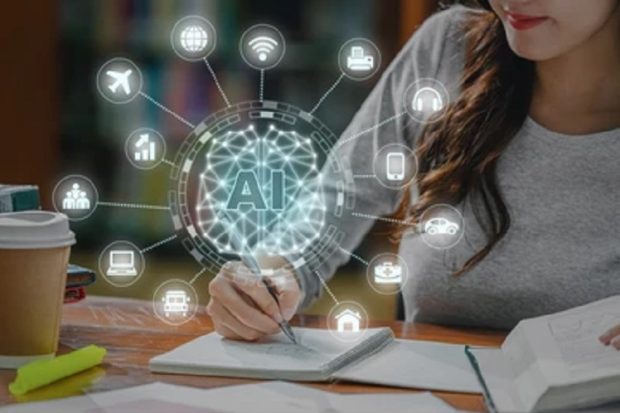
4 ways that AI can help students
PTI, Apr 13, 2023, 12:58 PM IST

Credit: Shutterstock Photo
As artificial intelligence systems play a bigger role in everyday life, they’re changing the world of education, too.
OpenAI’s ChatGPT, Microsoft’s Bing and Google’s Bard all come with both risks and opportunities.
I am a literacy educator and researcher, and here are four ways I believe these kinds of systems can be used to help students learn.
Differentiated instruction
Teachers are taught to identify the learning goals of all students in a class and adapt instruction for the specific needs of individual students.
But with 20 or more students in a classroom, fully customised lessons aren’t always realistic. Everyone learns differently.
An AI system can observe how a student proceeds through an assigned task, how much time they take and whether they are successful.
If the student is struggling, the system can offer help; if the student is succeeding, the system can present more difficult tasks to keep the activity challenging.
This type of real-time feedback is often difficult for an educator or school to do for a single student, let alone an entire class or campus.
AI adaptive learning tools have been shown to quickly and dynamically make changes to the learning environment, content, and tasks to help individuals learn more and quickly improve.
For instance, researchers at the Human-Computer Interaction Institute at Carnegie Mellon University taught a system how to solve a math problem.
The system can follow instructions from a human supervisor to understand mathematical rules and adapt its approach to problems it has never seen before.
The system can also identify areas where it had to make multiple attempts before arriving at the correct answer, flag those for teachers as places human students may get confused, and highlight methods the system used to more efficiently arrive at the right answer.
Intelligent textbooks
Researchers at Stanford have been developing and testing a prototype of what’s called an “intelligent textbook,” titled “Inquire.” It is an iPad app that monitors students’ focus and attention while they read by paying attention to how students interact with the app.
The interactive text includes definitions of key words accessible by touch or click and allows students to highlight and annotate while reading.
The textbook can also suggest questions about the content and areas for future inquiry that are customised for each individual.
It can change the reading level of the text and also include supplemental photos, videos and materials to help students understand what they’re studying.
Improved assessment
Educational assessment focuses on how an educator knows whether a student is learning what is being taught. Traditional assessments – essays, multiple-choice tests, short-answer questions – are little changed from a century ago.
Artificial intelligence has the potential to change that by identifying patterns in learning that may not be apparent to individual teachers or administrators.
For instance, the language-learning company Duolingo uses AI and machine learning to create and score tests of English proficiency for universities, companies and government agencies. The tests start with a series of standard questions, but based on how the student does with those, the system will select harder or easier questions to more quickly identify a student’s exact abilities and weaknesses.
Another assessment project, Reach Every Reader, staffed by the Harvard Graduate School of Education, MIT and Florida State University, creates educational games for parents to play with their children while teaching them to read. Some of the games have adults and children role-play as characters based on real-life scenarios.
These games can help parents and teachers efficiently determine whether children are reading at their appropriate grade level and get them on track if they are not.
Personalised learning
Personalised learning occurs when the students’ interests and goals guide learning. The teacher is more of a facilitator, while the what, why and how of learning are mostly dictated by the student. Artificial intelligence systems can provide individualised instruction tailored to each student’s individual interests.
AI adaptive learning systems can quickly identify when a student is struggling and then provide more or different support to help them succeed. As the student shows that they have mastered the content or skill, the AI tool provides more difficult tasks and materials to further challenge the learner.
Chatbots have been used to respond to typed or spoken input. Many individuals interact with a chatbot when they ask Alexa or Siri a question. In education, chatbots with artificial intelligence systems can guide students with personalized, just-in-time feedback or assistance. These chatbots can answer questions about course content or structure. This helps students keep track of their own learning while keeping them motivated and engaged.
Much like an automated playlist of musical or video recommendations, an AI-powered recommender system can generate tailored assessment questions, detect misunderstandings and suggest new areas for a learner to explore. These AI technologies have the potential to help learners today and in the future.
Udayavani is now on Telegram. Click here to join our channel and stay updated with the latest news.
Top News

Related Articles More

‘Life sprouts in space’, says ISRO after cowpea seeds germinate under microgravity conditions

AI tools like GPT-4 do not fare well in ‘conversing’ with patients, study finds

Andhra Pradesh-based start-up tests ultra-high-frequency communication tech on ISRO’s POEM-4

New Year’s greetings with an artificial but intelligent twist

Space docking experiment: Spacecraft injected into right orbit, ISRO eyes another tech feat
MUST WATCH
Latest Additions

TN CM announces USD 1 million prize for decoding Indus valley script

PM assures no welfare scheme to be stopped if BJP forms govt in Delhi, says AAP has no vision

Siddaramaiah urges youth to stay away from divisive forces misusing religion, caste

Kasaragod: Fire breaks out at plywood mill in Battipadavu

Ramesh Bidhuri expresses regret as row erupts over his ‘roads like Priyanka Gandhi’s cheeks’ remarks
Thanks for visiting Udayavani
You seem to have an Ad Blocker on.
To continue reading, please turn it off or whitelist Udayavani.



















